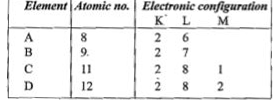The element which is electropositive in nature?
Sulphur
Silicon
Boron
Copper
The correct Answer is:C
To determine which element among sulfur, silicon, boron, and copper is the most electropositive, we need to analyze the electronic configurations and the tendency of each element to donate electrons.
1. Understanding Electropositivity:
- Electropositive elements are those that tend to lose electrons easily and form positive ions. They are typically metals or metalloids.
2. Analyzing the Elements:
- Sulfur (S):
- Electronic configuration: Ne 3s² 3p⁴
- Sulfur has a tendency to gain electrons to achieve a stable octet, making it more electronegative than electropositive.
- Silicon (Si):
- Electronic configuration: Ne 3s² 3p²
- Silicon can donate 2 electrons, but it is less reactive compared to other elements in this list.
- Boron (B):
- Electronic configuration: He 2s² 2p¹
- Boron can easily donate 1 electron, making it more reactive and electropositive compared to silicon and sulfur.
- Copper (Cu):
- Electronic configuration: Ar 3d¹⁰ 4s¹
- Copper can donate 1 electron but also has the ability to accept electrons, making it less electropositive than boron.
3. Comparing Electropositivity:
- Among the elements:
- Sulfur is not electropositive as it tends to gain electrons.
- Silicon can donate 2 electrons but is less reactive.
- Boron can donate 1 electron and is very reactive.
- Copper can donate and accept electrons but is less reactive than boron.
4. Conclusion:
- Comparing the tendencies to donate electrons, boron is the most electropositive element among the given options, as it has the highest reactivity in donating its single electron.
Final Answer:
The element which is electropositive in nature is Boron.
---
- Electropositive elements are those that tend to lose electrons easily and form positive ions. They are typically metals or metalloids.
- Sulfur (S):
- Electronic configuration: Ne 3s² 3p⁴
- Sulfur has a tendency to gain electrons to achieve a stable octet, making it more electronegative than electropositive.
- Silicon (Si):
- Electronic configuration: Ne 3s² 3p²
- Silicon can donate 2 electrons, but it is less reactive compared to other elements in this list.
- Boron (B):
- Electronic configuration: He 2s² 2p¹
- Boron can easily donate 1 electron, making it more reactive and electropositive compared to silicon and sulfur.
- Copper (Cu):
- Electronic configuration: Ar 3d¹⁰ 4s¹
- Copper can donate 1 electron but also has the ability to accept electrons, making it less electropositive than boron.
- Among the elements:
- Sulfur is not electropositive as it tends to gain electrons.
- Silicon can donate 2 electrons but is less reactive.
- Boron can donate 1 electron and is very reactive.
- Copper can donate and accept electrons but is less reactive than boron.
- Comparing the tendencies to donate electrons, boron is the most electropositive element among the given options, as it has the highest reactivity in donating its single electron.
The element which is electropositive in nature is Boron.
Topper's Solved these Questions
Similar Questions
Knowledge Check
Which one of the following electronic configuration
corresponds to the element with maximum
electropositive character?A(a) [Kr]5s1B(b) [Ne]3s1C(c) [Ar]4s1D(d) [Xe]6s1In the following, the elements with the highest electropositivity is:
AcopperBcesiumCbariumDchromiumIn the following, the element with the highest electropositivity is
AcopperBcesiumCbariumDchromium
The no. of elements which are more electropositive than 'Fe' in the following Sc,Rb,Te,F & Ca
View SolutionAmong the elements with Z=9,12 and 36, identify by atomic number of an element which is
(a) Highly electropositive
(b) Highly EN
( c) An inert gas
View SolutionWhich of the following element is most electropositive ?
View SolutionWhich of the following element is most electropositive?
View SolutionWhich one of the following element the most electropositive element ?
View Solution

